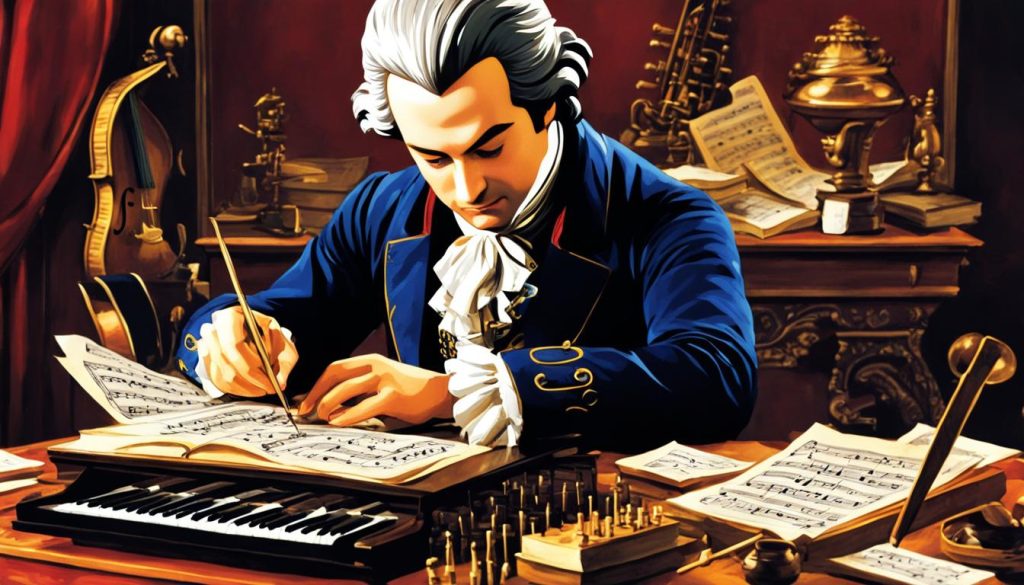Mozart Music: Classical Compositions Explored
Wolfgang Amadeus Mozart is undoubtedly one of the most prominent figures in music history. His works have inspired countless musicians and listeners around the world, and his legacy continues to live on to this day. In this section, we will explore the timeless classical compositions that have made Mozart music synonymous with artistic perfection and cultural refinement.
From the dramatic intensity of “Requiem” to the melodic beauty of “Eine Kleine Nachtmusik,” Mozart music reflects his innovative style and impeccable craftsmanship. His compositions are characterized by their intricate harmonies, elaborate instrumentation, and evocative emotion.
Join us as we delve deeper into the life, works, and legacy of this musical genius and explore the impact he has had on the world of classical music.
Key Takeaways
- Wolfgang Amadeus Mozart is one of the most prominent figures in music history, known for his impeccable craftsmanship and innovative style.
- Mozart’s works continue to inspire countless musicians and listeners around the globe, reflecting his melodic beauty and emotional depth.
- Exploring Mozart’s music provides insights into his life, legacy, and contributions to the classical music landscape.
- Mozart’s compositions are characterized by intricate harmonies, elaborate instrumentation, and evocative emotion.
- The impact of Mozart’s music on the world of classical music remains an enduring legacy, showcasing his lasting influence on musical brilliance and talent.
The Life and Legacy of Wolfgang Amadeus Mozart
Wolfgang Amadeus Mozart was a musical prodigy born in Salzburg, Austria, in 1756. His father Leopold Mozart, a successful composer and music teacher, recognized his son’s exceptional talent at an early age and dedicated himself to developing his skills.
As a child, Mozart traveled extensively throughout Europe, performing for royalty and the upper class. He composed his first symphony at only eight years old and went on to produce over 600 works in his short life.
Mozart’s legacy as a musical genius continues to inspire and captivate audiences worldwide. His contributions to classical music, opera, and the piano concerto are unparalleled, and have earned him a significant place in the history of music.
| Significant Milestones | Impact on Music |
|---|---|
| 1763-1766: Tours of Europe | Exposed audiences to the beauty and complexity of classical music |
| 1781: Premiere of Idomeneo | Established Mozart as a leading figure in opera |
| 1785: Premiere of The Marriage of Figaro | Considered one of Mozart’s greatest operatic achievements |
| 1791: Death at 35 years old | Left behind a lasting legacy of unparalleled musical brilliance |

Mozart’s compositions transcend time and have remained popular even centuries after his death. His legacy as a musical genius has influenced countless composers, and his impact on music history continues to be celebrated and studied by musicians and scholars worldwide.
Mozart’s Masterpieces: Unraveling Musical Brilliance
Mozart’s music is a testament to his exceptional talent as a composer. His works, from symphonies to operas and piano concertos, showcase his musical brilliance and have earned him a place in the pantheon of classical music.
Mozart was renowned for his unique style, which was characterized by its elegance, clarity, and emotional depth. He was a master at using orchestration to convey the mood of his compositions, and his use of themes and motifs created works that were both memorable and timeless.
One of his most famous works is his Symphony No. 40, which has since become a staple of the classical repertoire. The symphony features a remarkable blend of both minor and major tonalities, creating a sense of drama and melancholy that is characteristic of Mozart’s music.
Another masterpiece of Mozart’s is his opera, The Marriage of Figaro, which is widely regarded as one of his finest accomplishments. The opera features intricate ensembles, soaring arias, and a lush orchestral score that exemplifies the best of Mozart’s musical brilliance.
Mozart’s Piano Concerto No. 21 is yet another example of his remarkable talent. The concerto is notable for its use of a three-movement structure and its unique solo piano writing, which allowed Mozart to showcase his virtuosity as a pianist and composer.
Overall, Mozart’s masterpieces are a testament to his musical genius and continue to captivate audiences today. His innovative use of orchestration, emotional depth, and unique style have earned him a place in the pantheon of classical music that will undoubtedly endure for centuries to come.
“The music is not in the notes, but in the silence between.” – Wolfgang Amadeus Mozart

Mozart’s Masterpieces and Their Key Elements
| Masterpiece | Key Elements |
|---|---|
| Symphony No. 40 | Blend of minor and major tonalities, dramatic mood |
| The Marriage of Figaro | Intricate ensembles, soaring arias, lush orchestration |
| Piano Concerto No. 21 | Three-movement structure, unique solo piano writing |
Conclusion
In conclusion, the legacy of Mozart music and his classical compositions continues to captivate audiences worldwide. Mozart’s unparalleled talent as a composer and his influence on music history remain a testament to his undeniable genius. His music has stood the test of time and continues to inspire new generations of musicians.
Exploring Mozart’s classical compositions is an experience that every music lover must have. From the delicate melodies of his piano sonatas to the grandiose crescendos of his symphonies, Mozart’s music leaves a lasting impression on the soul. His contributions to the world of music have earned him a place among the greatest musical geniuses of all time.
Whether you are a classical music enthusiast or are new to the world of Mozart, his music has something to offer everyone. So, take a moment to sit back, relax, and immerse yourself in the timeless beauty of Mozart’s classical compositions.
FAQ
What are some of Mozart’s most well-known compositions?
Mozart’s most well-known compositions include Symphony No. 40 in G minor, Eine kleine Nachtmusik, The Marriage of Figaro, and Piano Concerto No. 21 in C major.
How many symphonies did Mozart compose?
Mozart composed a total of 41 symphonies throughout his lifetime.
What makes Mozart’s music unique?
Mozart’s music is known for its melodic beauty, intricate harmonies, and emotional depth. His compositions often display a perfect balance between complexity and accessibility.
What role did Mozart play in the development of classical music?
Mozart played a pivotal role in the development of classical music. His compositions bridged the gap between the Baroque and Classical periods, and his innovative style laid the foundation for future composers.
What instruments did Mozart primarily compose for?
Mozart composed for a wide range of instruments, including the piano, violin, flute, and clarinet. He also wrote extensively for orchestras, creating symphonies and concertos.
How did Mozart’s upbringing contribute to his musical genius?
Mozart had a unique upbringing that contributed to his musical genius. He was introduced to music at an early age by his father, a skilled musician himself, and received rigorous training throughout his childhood.
What impact did Mozart have on the opera genre?
Mozart’s operas revolutionized the genre, introducing a new level of emotional depth and theatricality. His works, such as The Magic Flute and Don Giovanni, continue to be performed and celebrated today.
